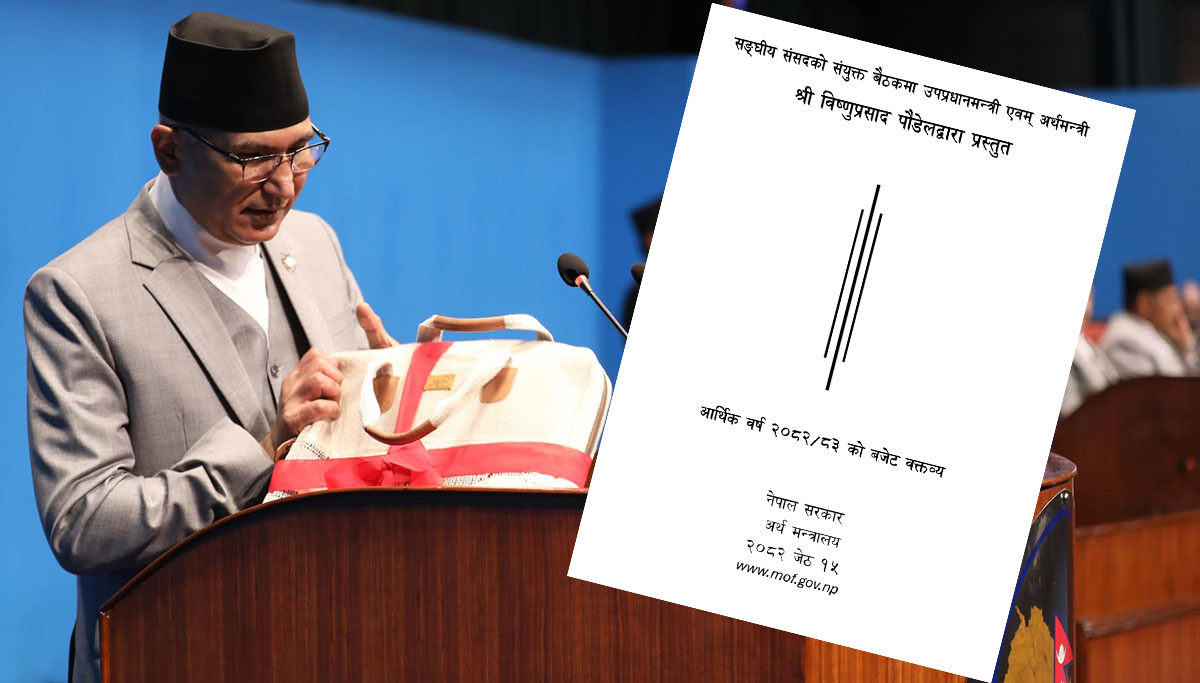
Education Budget 2082/83: Quality and Human Capital Development
A capable, entrepreneurial, and productive human capital base will be developed to enable individuals to shape their own futures. The education system will be modernized and made technology-friendly.
School Incentive Program Based on Academic Performance
An incentive program will be implemented in 100 schools—at least one from each district—based on academic results. These schools will be supported to help improve the performance of others. Each school will receive Rs. 2.5 million under this program.
School Mapping and Consolidation Strategy
Schools will be re-mapped based on student-teacher ratio, geographic distance, and transport facilities. A policy to merge schools will be implemented. Merged schools will receive incentive grants. Teacher positions will be reviewed, and periodic training programs will be arranged to enhance teacher capabilities.
Promoting Educational Accountability and Teacher Deployment
Policies will be introduced to expand corporate social responsibility and apply it to improve the quality and outcomes of school education. Best management practices from institutional and community schools will be leveraged to uplift other community schools. A teacher bank will be established in collaboration with universities to address shortages in English, Science, and Mathematics. Graduates will be mobilized as volunteer teachers.
Conditional Grants and Exam Decentralization
Conditional grant programs in education will gradually be transformed into financial equalization grants. Management and operation of secondary school examinations will be delegated to the provincial level.
Mid-Day Meal and Sanitary Pad Distribution Programs
The mid-day meal program for students up to Grade 5 will be expanded, allocating Rs. 10.19 billion, benefiting 2.8 million students. The free sanitary pad distribution program will continue with a budget of Rs. 1.29 billion, supporting 1.3 million female students.
Scholarships for Marginalized and Remote Communities
Scholarships for targeted communities and remote Himalayan districts will continue. Special incentive scholarships will be provided for Musahar, Dom, and Chamar communities to pursue higher education in medicine. Rs. 2.44 billion has been allocated for scholarships.
Increased Grants for Early Childhood and Support Staff
Conditional grants for early childhood development workers and school staff at community schools will be increased. Rs. 10.16 billion has been allocated for this purpose.
Indigenous Learning Systems and Digital Learning
A teaching-learning system based on Nepali originality will be developed. Virtual teaching methods will be introduced in schools. A digital learning portal will be developed to improve quality. Hostel facilities will be arranged for students with disabilities to complete basic education. National standards will be prepared for effective monitoring of private schools.
Preservation of Traditional Educational Systems
Traditional learning systems such as Gurukul, Gumba, and Madarasa will be preserved and promoted for their subject-specific and stylistic uniqueness.
Capital Grants for Infrastructure in Schools
Under the National Education Reform Program, capital grants will be provided for infrastructure development in schools with more than 1,500 students in Terai-Madhesh, 1,000 in hills, and 500 in the mountains. Ongoing model school construction projects will be completed. Rs. 2.72 billion has been allocated for this purpose.
Higher Education Reform and Standardization
Higher education will be made research-focused. A comprehensive umbrella act will be formulated to ensure uniform governance across universities. Efforts will be made to reduce outbound student migration and align education with labor market demands. University departments and faculties will be restructured.
Strengthening the University Grants Commission
The University Grants Commission will be restructured into a robust regulatory body. Grants will be provided to universities based on student numbers, academic quality, and infrastructure needs. An academic calendar must be published before the academic year begins, and grants will be withheld if not followed.
University Infrastructure and Management
Infrastructure and personnel management for Madan Bhandari University of Science and Technology will proceed. Dasharath Chand Health Sciences University will be launched. Infrastructure development for Yogmaya Himalayan Ayurvedic University will begin.
International Students and Visa Facilities
Policies will be adopted to attract foreign students to universities. Free visas will be provided to international students for the duration of their academic calendar. Multiple-entry visas will be arranged for their guardians.
Medical Education Scholarships Based on Need
Scholarships will be provided to produce human resources required in the public health system. As per the High-Level Economic Reform Commission’s recommendations, medical education scholarships will focus on poor, meritorious, and extremely remote students.
Funding for Medical Colleges
Rs. 560 million has been allocated to continue infrastructure development of medical colleges in Bardibas, Butwal, Surkhet, and Dadeldhura.
Technical Education Quota Expansion
To address the shortage of skilled manpower in fields like medicine, engineering, IT, and nursing, existing standards will be reviewed, and student quotas will be increased.
Promoting TVET and University Pathways
Students completing school education will be encouraged to pursue technical, vocational, or university education based on results. Those unable to pursue higher education will receive skills training to foster entrepreneurship. The Council for Technical Education and Vocational Training (CTEVT) will provide over 26,900 youths with training programs lasting more than six months.
Provincial Model Technical Institutions
One technical institute in each province will be selected and upgraded into a model school. Technical stream students from general schools will be allowed to use the infrastructure of such institutions for skill development.
Internship Programs and Work-Study Opportunities
Interns will be mobilized in public institutions based on service nature. A work-study program will be launched to promote entrepreneurship-focused education, ensuring a minimum wage for 20 hours of weekly work.
Total Allocation for Education, Science, and Technology
Rs. 211.17 billion has been allocated to the Ministry of Education, Science, and Technology for the fiscal year.



